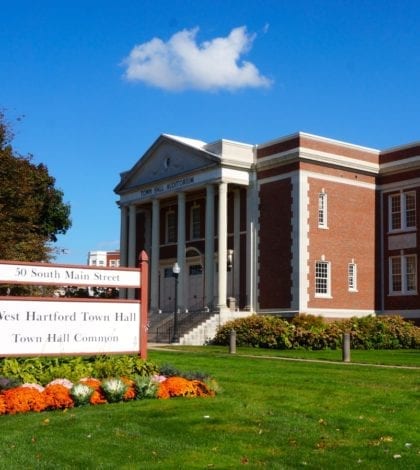West Hartford Town Council to Vote Tuesday on Amended Budget

Audio By Carbonatix

West Hartford Town Hall. Photo credit: Ronni Newton
The West Hartford Town Council will consider a budget for 2018-2019 with a mill rate that has been reduced from the town manager’s original proposal and represents a tax increase of 2.37 percent for the ‘average’ homeowner.
By Ronni Newton
The West Hartford Town Council will vote to adopt the FY2019 budget on April 24, but the document they will consider has been somewhat changed since the budget was originally proposed by Town Manager Matt Hart on March 12.
The Council will vote to adopt a uniform mill rate of 41.29 mills, a quarter of a mill down from the 41.54 mill rate proposed in March. The current mill rate is 41.04 mills for real and personal property and 32.00 mills for motor vehicles.
Over the past six weeks, Council members have been meeting in committee to review all aspects of the budget, and have held extensive discussions with town staff. What they will consider next Tuesday night is a total spending plan of $287,782,611, reduced by $536,725 from the $288,319,336 spending plan Hart originally proposed.
Hart presented the options for amending the budget at a meeting of the Town Council’s Budget and Finance Committee held on Monday night, and they were further discussed at a meeting of the committee held on Wednesday night.
If approved by the Council at its meeting on April 24, the revised budget will represent an increase of $9,186,438, over the FY2018 budget net of the $7.1 million contingency fund. On a percentage basis, the spending increase will be 3.3 percent over FY2018, while the originally proposed increase was 3.49 percent.
The net proposed reduction of expenses of $546,725 was made after careful line-item review of department budgets. “In talking to directors, they were asked to squeeze as much as possible,” Hart said, and he said he’s very thankful in particular for the savings that Public Works and Plant Services directors were able to identify. Funding for two vacant grounds maintainers has been eliminated, for a savings of $120,000, and temporary payroll in facilities services has been reduced by $30,000. Other cuts include a reduction in contribution to the risk management fund ($100,000), a reduction in the utility services fund contribution of $50,000 due to estimated gas prices, a reduction of $50,000 in the contingency fund for wage settlements, and use of surplus to further reduce the utility services fund by $50,000.
The largest proposed reduction – $200,000 – was made to the Board of Education budget. The Town Council cannot make specific line item reductions to education funding – those must be approved by the Board of Education – but can cut the overall budget. Hart said that he spoke with Superintendent of Schools Tom Moore about plans to make the cut, but doesn’t have the specific details about how it will be managed.
“We’re partners. I talked to him about it,” Hart said. “We certainly wouldn’t want to surprise the district because we have a good working relationship.”
Moore is out of town attending a conference and could not be reached for comment.
The Board of Education approved Moore’s $164,551,227 budget on April 3 by a vote of 5-2 along party lines, without making any changes to the original proposal.
There was one additional expense Hart added to the revised the budget numbers: $63,275 for maintenance of the police and fire radio system.West Hartford CFO Peter Privitera said the original estimate was determined not to be enough to cover the time until the town switches to a new system in December or January.
Since the budget was first developed, Hart said that he and Privitera have also had the opportunity to review additional revenue information, and based on recent data have increased the town’s non-tax revenues by $402,757.
“We looked at all revenue categories, and those that are trending higher we’re proposing to increase,” Privitera said. Increases include estimated additional paramedic service fees of $100,000 and estimated increased workers’ compensation reimbursement of $120,000.
Hart said Wednesday afternoon that he had wanted to increase the town’s unreserved General Fund balance from 8.1 percent to 9.1 percent, at a cost of $293,000, because it was an action recommended by Moody’s to preserve West Hartford’s AAA bond rating. “The additional $293,000 was a recommendation, but I understand it’s too much to do in just a year’s time,” he said.
The town has already taken significant steps to shore up its General Fund balance. In December 2017, the Town Council approved the transfer of $3.2 million of surplus from FY2017 into the General Fund, increasing the ratio from 8.1 to 9 percent.
Privitera said that each category of the town’s Grand List was also carefully reviewed, and he and Hart determined they “may have been a little conservative” in estimating revaluation disputed adjustments. An adjustment they have now made will add $353,869 in revenue.
The total impact of the changes to the original proposal is a reduction of $1,586,351 in taxes needed to support the proposed spending plan.
Based on the same scenario that was presented on March 12, with a uniform mill rate of 41.29 mills, the average homeowner with two vehicles will now see taxes increase by $233, or 2.37 percent for FY2019. In West Hartford, the “average” homeowner has a home assessed at $224,000, and two vehicles assessed at $9,000 each.
“I think we submitted a proposed budget designed to maintain programs and services, to address the fund balance and shore up critical liabilities,” Hart said Wednesday. Changes made over the past several weeks have been based on discussions held in Council committees, and with the understanding that the Council wanted a lower tax increase.
The Town Council has also held two public hearings on the budget. At the first hearing, on April 4, only two residents spoke and requested modification to the budget. Sixteen residents spoke at an April 11 hearing, requesting spending reductions.
“At this point it’s in the Council’s hands,” Hart said. If the budget is adopted, there is also the possibility that a referendum may be forced, which is permitted under the town’s charter if a petition is filed within 25 days of budget adoption, and with the valid signatures of 6 percent of the electorate.
“It’s our job to provide the Council the support and analysis they need,” Hart said, however, he added that the bulk of the town’s spending involves staffing, and there’s not a lot of room to make adjustments.
Salaries as well as the cost of special education and transportation are some of the primary costs driving the education budget increase for FY2019, and funding for education is approximately 57 percent of the town’s budget.
The most significant cost driver on the town side is an actuarially-determined increase of $2.3 million for employer contributions (ADEC) to the pension fund. Other significant increases are funds that will be set aside to cover unsettled labor contracts since all of the town’s collective bargaining agreements are coming up for renewal and are under discussion right now.
In addition, the Metropolitan District Commission (MDC) is increasing the town’s ad valorem tax for wastewater service by just over $1 million, or 10.8 percent.
Hart said that no formal motions to amend the budget beyond what he proposed on Monday were made at Wednesday night’s Finance and Budget Committee meeting, and Hart is pleased with how engaged the Council has been throughout the entire process.
“Most of the conversation was about the need for longterm fiscal stability,” Hart said. “I think there’s genuine interest on the part of the Council in engaging in this longterm plan.” Putting a plan together, and implementing it, will take several years.
“I’ve pushed for a study by the MDC to eliminate the ad valorem,” Mayor Shari Cantor said, and that’s currently ongoing. It’s an antiquated system, and the EPA has put a moratorium on further use of ad valorem, she said. Payments to the MDC account for 1.72 mills of the tax rate, but any change in the structure couldn’t impact this budget cycle.
Cantor said that it will also be important to get feedback from the public as the Council considers its longterm strategy. “We want to know what’s important to them, what they’re concerned about,” she said.
The structure of town departments, contractual obligations, and pension financing will be some of the key issues to be discussed as part of strategic planning to ensure that the town is prepared to face the future’s fiscal challenges, Cantor said. “We want to make ourselves as stable and resilient as we can be.”
Like what you see here? Click here to subscribe to We-Ha’s newsletter so you’ll always be in the know about what’s happening in West Hartford!




Something doesn’t smell right if the budget is increasing 3.3% and “average” homeowners are being led to believe they’ll see a 2.37% increase.
Auto rates alone are going up to 41 from 32 mils, which is 28% increase for car owners.
Some candor is due from our town administrators.
Spending is increasing by 3.3 percent, but there are also revenue increases which is why the tax increase to the average homeowner is less.
[…] addition to the cuts, revenue estimates have been increased in several categories, several of which were discussed by the Town Council’s Budget and Finance Committee last week. The net effect was an adjustment of $1.6 million. Revenue estimates were amended based on updated […]